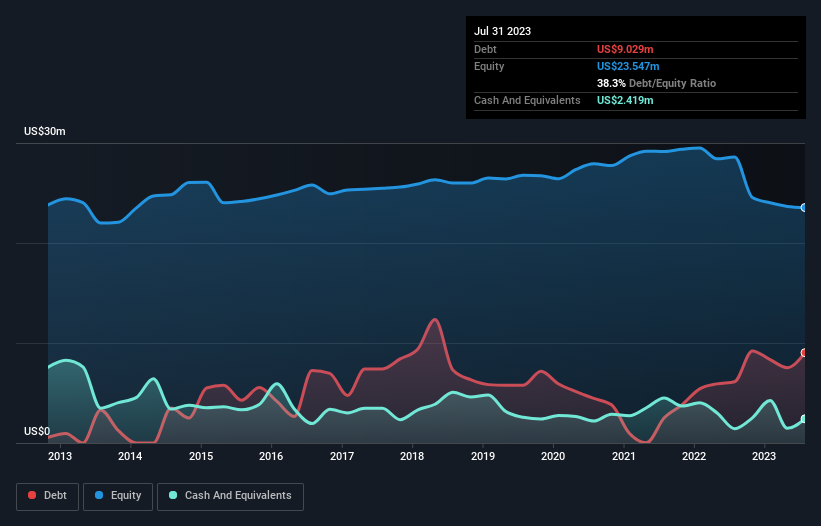Howard Marks put it nicely when he said that, rather than worrying about share price volatility, 'The possibility of permanent loss is the risk I worry about... and every practical investor I know worries about.' It's only natural to consider a company's balance sheet when you examine how risky it is, since debt is often involved when a business collapses. We note that Coffee Holding Co., Inc. (NASDAQ:JVA) does have debt on its balance sheet. But is this debt a concern to shareholders?
Why Does Debt Bring Risk?
Debt is a tool to help businesses grow, but if a business is incapable of paying off its lenders, then it exists at their mercy. In the worst case scenario, a company can go bankrupt if it cannot pay its creditors. However, a more common (but still painful) scenario is that it has to raise new equity capital at a low price, thus permanently diluting shareholders. By replacing dilution, though, debt can be an extremely good tool for businesses that need capital to invest in growth at high rates of return. The first thing to do when considering how much debt a business uses is to look at its cash and debt together.
Check out our latest analysis for Coffee Holding
What Is Coffee Holding's Debt?
As you can see below, at the end of July 2023, Coffee Holding had US$9.03m of debt, up from US$6.13m a year ago. Click the image for more detail. On the flip side, it has US$2.42m in cash leading to net debt of about US$6.61m.

How Strong Is Coffee Holding's Balance Sheet?
According to the last reported balance sheet, Coffee Holding had liabilities of US$12.4m due within 12 months, and liabilities of US$3.37m due beyond 12 months. On the other hand, it had cash of US$2.42m and US$6.48m worth of receivables due within a year. So its liabilities total US$6.87m more than the combination of its cash and short-term receivables.
When you consider that this deficiency exceeds the company's US$5.08m market capitalization, you might well be inclined to review the balance sheet intently. Hypothetically, extremely heavy dilution would be required if the company were forced to pay down its liabilities by raising capital at the current share price. There's no doubt that we learn most about debt from the balance sheet. But it is Coffee Holding's earnings that will influence how the balance sheet holds up in the future. So if you're keen to discover more about its earnings, it might be worth checking out this graph of its long term earnings trend.
In the last year Coffee Holding had a loss before interest and tax, and actually shrunk its revenue by 4.4%, to US$65m. That's not what we would hope to see.
Caveat Emptor
Importantly, Coffee Holding had an earnings before interest and tax (EBIT) loss over the last year. Its EBIT loss was a whopping US$3.6m. Considering that alongside the liabilities mentioned above make us nervous about the company. It would need to improve its operations quickly for us to be interested in it. Not least because it burned through US$2.2m in negative free cash flow over the last year. So suffice it to say we consider the stock to be risky. There's no doubt that we learn most about debt from the balance sheet. But ultimately, every company can contain risks that exist outside of the balance sheet. Case in point: We've spotted 2 warning signs for Coffee Holding you should be aware of.
Of course, if you're the type of investor who prefers buying stocks without the burden of debt, then don't hesitate to discover our exclusive list of net cash growth stocks, today.
New: AI Stock Screener & Alerts
Our new AI Stock Screener scans the market every day to uncover opportunities.
• Dividend Powerhouses (3%+ Yield)
• Undervalued Small Caps with Insider Buying
• High growth Tech and AI Companies
Or build your own from over 50 metrics.
Have feedback on this article? Concerned about the content? Get in touch with us directly. Alternatively, email editorial-team (at) simplywallst.com.
This article by Simply Wall St is general in nature. We provide commentary based on historical data and analyst forecasts only using an unbiased methodology and our articles are not intended to be financial advice. It does not constitute a recommendation to buy or sell any stock, and does not take account of your objectives, or your financial situation. We aim to bring you long-term focused analysis driven by fundamental data. Note that our analysis may not factor in the latest price-sensitive company announcements or qualitative material. Simply Wall St has no position in any stocks mentioned.
About NasdaqCM:JVA
Coffee Holding
Engages in manufacturing, roasting, packaging, marketing, and distributing roasted and blended coffees in the United States, Australia, Canada, England, and China.
Proven track record with adequate balance sheet.
Similar Companies
Market Insights
Community Narratives




